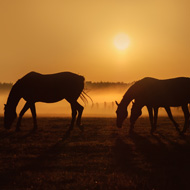Fly-grazing law 'having a real impact'

Awareness of the act is crucial for its success, campaigners say.
New figures show there has been a reduction in the number of fly-grazed horses in England and Wales since the introduction of new legislation last year. However, campaigners say greater awareness of the law is key to tackling the issue on a wider scale.
Current estimates suggest there are between 3,000 and 3,500 horses being illegally fly-grazed across England and Wales - the same number fly-grazed in England alone in 2014.
The Control of Horses Act was introduced in England in May 2015. It gives landowners more power to swiftly remove horses left to graze on their land. There are also more options for the disposal of horses, rather than just public sale. They can be gifted to a welfare charity, sold privately or humanely euthanised.
A coalition of animal welfare and rural organisations who campaigned for the law say there is strong evidence that the act is having a real impact on fly-grazing and is a vital tool for tackling a serious horse welfare issue.
However, awareness of the act is crucial for its success. Where it has been used effectively, fly-grazed horses have been swiftly removed, safeguarding their welfare and that of the surrounding communities. Furthermore, areas that have suffered recurrent problems have managed to eradicate fly-grazing.
In contrast, areas that have not made use of the act have actually seen a rise in fly-grazed horses, according to the charity World Horse Welfare (WHW), which was part of the coalition alongside the RSPCA, Blue Cross and Countryside and Land Association (CLA), among many others.
CLA president Ross Murray, added: "The introduction of this new law was an important change for the countryside, and now the challenge is to ensure it is widely and consistently enforced…
"In areas where fly-grazing continues to be a problem, local authorities and police forces must now begin working together to enforce the act and support the local community in eradicating the problem."



 The RCVS has announced a new version of its 1CPD mobile app, with enhanced features for veterinary surgeons and veterinary nurses to record their continuing professional development.
The RCVS has announced a new version of its 1CPD mobile app, with enhanced features for veterinary surgeons and veterinary nurses to record their continuing professional development.